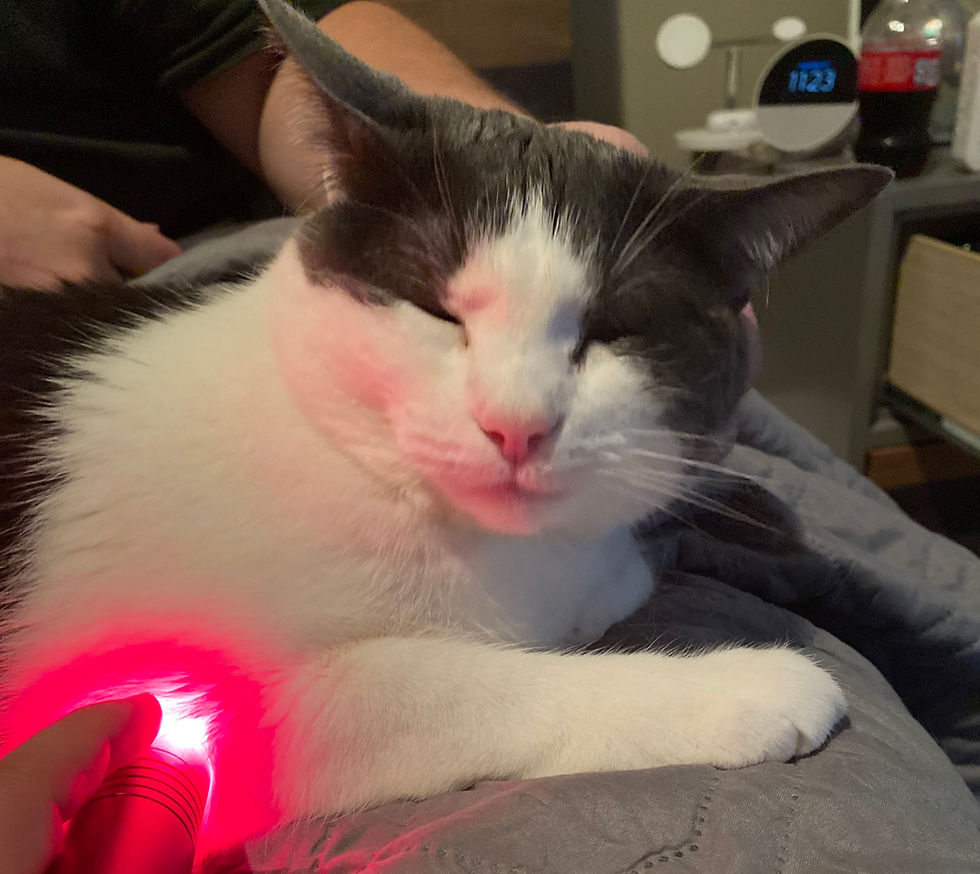A Brief Guide to Understanding the Acupressure Meridian System in Pets
- Nov 25, 2024
- 7 min read
Updated: May 21, 2025

The meridian system is a fundamental concept in Traditional Chinese Medicine (TCM) that represents an intricate network of energy pathways running throughout the body. In pets, as in humans, these pathways are essential for the flow of vital energy known as Chi, which nourishes and supports every organ and tissue. Meridians function much like highways that connect different parts of the body, allowing energy to move smoothly and balance the body’s physical, emotional, and mental well-being.
In TCM, it is believed that when this energy flows freely, pets remain healthy, vibrant, and balanced. However, blockages or imbalances within these meridians can lead to health issues such as digestive problems, anxiety, pain, or weakened immune function. By understanding and supporting the meridian system, pet owners can help restore balance and promote overall health.
The meridian system also plays a crucial role in holistic approaches to pet care. Techniques like acupressure and acupuncture work by stimulating specific points along the meridians to release energy blockages, encouraging the body’s natural healing processes. Maintaining the balance of Chi through the meridian system can greatly enhance your pet’s vitality and improve their quality of life.
Major Meridians in Pets
The meridian system in pets consists of several key energy pathways that correspond to vital organs and body functions. Each meridian has a specific role in supporting health, governing energy flow, and maintaining balance within the body. Below are some of the main meridians in pets and their functions:

Lung Meridian
The Lung Meridian governs the respiratory system and is responsible for taking in fresh energy (Chi) through breathing. It plays a vital role in immune function, skin health, and maintaining the flow of defensive energy (Wei Chi) that protects the body from external pathogens. Blockages in this meridian may result in respiratory issues or skin conditions.
Spleen Meridian
The Spleen Meridian is associated with digestion and the transformation of food into energy. It regulates blood flow, muscle health, and the immune system. When this meridian is out of balance, pets may experience digestive problems, fatigue, or weakened muscles.
Stomach Meridian
Paired with the Spleen, the Stomach Meridian also plays a significant role in digestion, nutrient absorption, and fluid balance. It helps ensure that food and fluids are properly processed and distributed throughout the body. An imbalance in this meridian may lead to conditions like vomiting, diarrhea, or bloating.

Kidney Meridian
The Kidney Meridian governs the urinary system, reproductive health, and the storage of essential life energy (Jing). This meridian is deeply connected to growth, development, and longevity. Blockages or deficiencies in the Kidney Meridian may lead to kidney disorders, reproductive issues, or even premature aging.
Heart Meridian
The Heart Meridian is responsible for emotional health, mental clarity, and circulation. It is closely tied to the emotional center, and imbalances here can lead to anxiety, restlessness, or cardiovascular problems. The Heart Meridian ensures the free flow of blood and energy throughout the body, maintaining emotional and physical balance.
These meridians, along with others such as the Bladder, Liver, and Gallbladder Meridians, work together to distribute energy and maintain harmony in the body. Each meridian connects internal organs to the exterior, ensuring communication between various body systems. When energy flows freely through these meridians, pets enjoy optimal health and vitality. However, disruptions in energy flow can lead to illness or discomfort, making it essential to maintain balance through practices like acupressure, acupuncture, or herbal therapies.
Acupressure Techniques: Stimulating Meridian Points for Health
Acupressure is a powerful technique that practitioners can use to stimulate specific points along the meridians to improve health and well-being in pets. These acupressure points, also called "acupoints," are located along the meridian pathways and are places where energy can be accessed and directed to address imbalances in the body. For those familiar with the meridian system, finding these key points can be an effective way to enhance your pet’s overall health.
Identifying Key Acupressure Points

Lung Meridian: Points along this meridian are often found around the chest and front limbs, where they can be stimulated to support respiratory function and boost immunity.
Spleen Meridian: Acupoints along this meridian, found on the inner legs, can help improve digestion and address energy deficiencies.
Kidney Meridian: Found along the lower back and hind limbs, these points are ideal for supporting kidney function and overall vitality.
Practitioners use their hands or fingers to gently apply pressure to these points, releasing blockages and promoting energy flow. With proper guidance, you can also learn how to locate and stimulate these points on your own pet for health maintenance.
Benefits of Acupressure
Acupressure offers a wide range of health benefits for pets, including:
Improving Circulation: Stimulating specific meridians enhances blood flow and oxygen distribution, promoting faster healing and overall vitality.
Relieving Pain: By targeting points associated with the nervous and musculoskeletal systems, acupressure can reduce pain and discomfort, particularly in pets with arthritis or injuries.
Enhancing Digestion: Acupoints along the Stomach and Spleen Meridians can improve digestion and nutrient absorption, helping pets with gastrointestinal issues.
Boosting Immunity: Stimulating points along the Lung and Kidney Meridians strengthens the immune system, helping pets fend off illness and recover faster.
For those interested in learning how to locate and use acupressure points to support your pet’s health, stay tuned for my upcoming class designed for pet owners. In this course, you’ll gain hands-on experience and detailed instruction on using acupressure techniques to keep your pets healthy and happy!
Common Health Conditions Addressed by Meridian Therapy

Meridian therapy is a powerful tool for addressing various health issues in pets, as imbalances in the flow of energy (Chi) along the meridians can manifest as physical or emotional problems. Understanding how these imbalances relate to specific health concerns allows practitioners to use acupressure or acupuncture to restore harmony and improve a pet’s well-being. Here are some common health conditions linked to meridian imbalances and how addressing them can bring relief.
Meridian Imbalances and Conditions
Digestive Conditions: Imbalances in the Spleen or Stomach Meridians can lead to digestive problems such as diarrhea, vomiting, bloating, or poor appetite. These meridians play a key role in nutrient absorption and the transformation of food into energy. Blockages or stagnation in these areas can prevent proper digestion and nutrient distribution, leading to long-term health issues if untreated.
Anxiety and Emotional Stress: The Heart Meridian is closely linked to emotional health, and imbalances here can result in anxiety, restlessness, or even behavioral problems. Pets experiencing fear or anxiety often exhibit conditions such as excessive barking, nervousness, or destructive behavior. Balancing the Heart Meridian helps calm the mind and improve emotional stability.
Mobility Problems and Pain: Issues with the Bladder or Kidney Meridians can lead to problems with mobility, stiffness, or joint pain, especially in older pets or those with arthritis. These meridians govern the health of the bones, muscles, and joints, and when they are blocked, pets may suffer from reduced mobility or discomfort.
Skin and Respiratory Problems: The Lung Meridian controls the respiratory system and skin health, meaning that imbalances here can manifest as respiratory infections, coughing, or skin irritations like hot spots. Pets with weakened Lung Meridian energy may also have more frequent colds or allergies.
Incorporating Meridian Work into Pet Care

Meridian work, when incorporated into a pet’s regular wellness routine, can be a powerful tool for both preventative care and maintaining overall health. Regularly stimulating the meridians helps keep energy (Chi) flowing smoothly, preventing blockages that can lead to health issues. By making meridian stimulation part of your pet’s care, you can support their vitality, improve immune function, and maintain emotional balance.
Want to learn how to activate acupressure points for your pets? Be sure to check our site often to sign up for our online owners guide for more detailed explanation of meridians, how to activate points, and more! Below are some of the benefits of acupressure for your pets!
Preventative Care and Maintenance
Incorporating meridian stimulation into your pet’s routine doesn’t have to be time-consuming or complicated. Here are a few simple ways to integrate meridian work for ongoing preventative care:
Daily or Weekly Acupressure: Performing acupressure on your pet a few times a week can help maintain the natural flow of energy and address any minor imbalances before they become larger health concerns. Focus on key acupressure points along the Kidney, Lung, and Stomach Meridians for general health support.
Observe Your Pet’s Behavior: Pay attention to your pet’s behavior and physical signs such as changes in appetite, energy levels, or emotional state. If you notice any irregularities, apply gentle acupressure to corresponding meridian points to help bring balance.
Seasonal Adjustments: TCM emphasizes that different seasons affect the body in various ways. Incorporating seasonal acupressure into your pet’s routine helps prepare their body for the changes ahead, supporting their immune system during the colder months and promoting fluid balance during warmer weather.
Combining Acupressure with Other Therapies

While acupressure is a powerful standalone therapy, it can be even more effective when combined with other holistic treatments. By incorporating a few complementary therapies, you can create a well-rounded care routine that supports your pet’s body and mind:
Red Light Therapy: Using red light therapy alongside meridian work can enhance circulation, promote tissue repair, and reduce inflammation. Red light applied to acupressure points stimulates healing while amplifying the benefits of meridian stimulation.
Massage: Gentle massage helps relax muscles and improve the flow of Chi along the meridians. Combining acupressure with a full-body massage can relieve tension, reduce stress, and provide comfort to pets with mobility issues or anxiety.
Herbal Therapies: TCM herbal formulas are designed to support organ health and balance energy flow. Herbal remedies targeted to specific meridians can help address deeper imbalances that acupressure alone may not resolve, offering more comprehensive support for conditions like digestive issues or chronic pain.
If you're interested in learning more about acupressure and how to apply it to support your own animals, be sure to check out our online course. Designed for both beginners and those looking to deepen their understanding, this course walks you through the foundations of acupressure, key points, and practical techniques you can start using right away. It’s a great way to confidently support your animal’s well-being from the comfort of home. Sign up today and start your journey into holistic animal care!
Incorporating meridian work into your pet’s regular wellness routine ensures that they maintain balanced energy, leading to better health, fewer illnesses, and a more harmonious emotional state. If you’re interested in learning how to integrate acupressure into your pet’s daily care, stay tuned for my upcoming online class, where you’ll gain hands-on knowledge and techniques to support your pet’s long-term health naturally!



